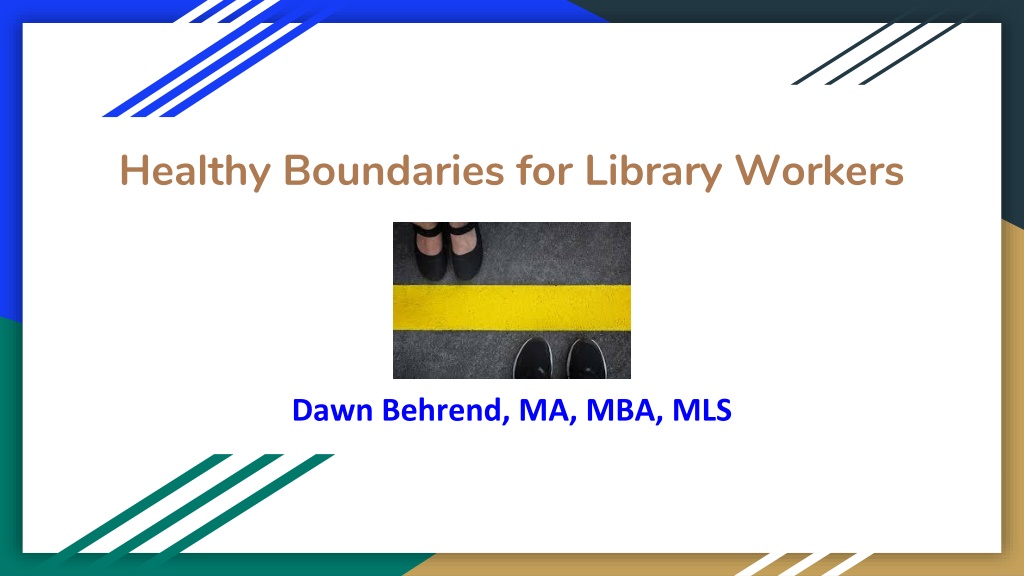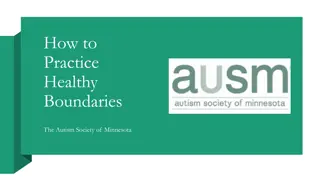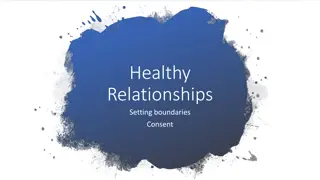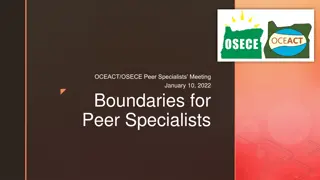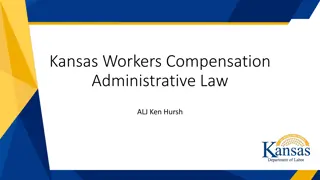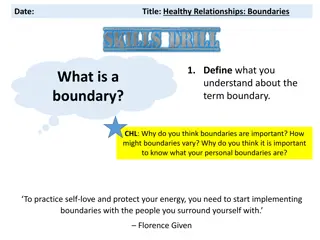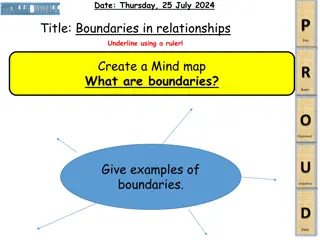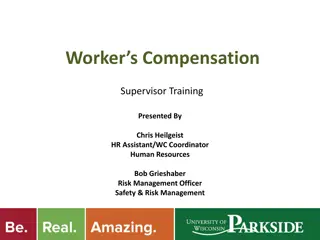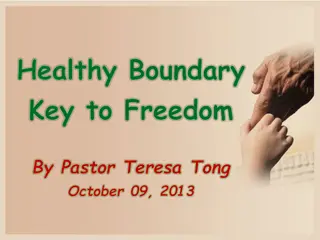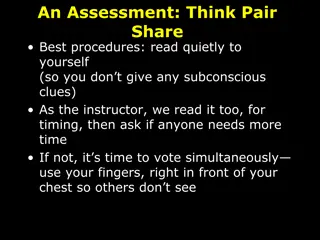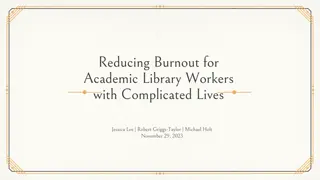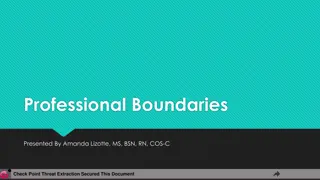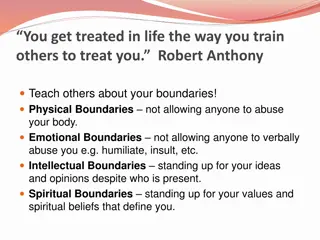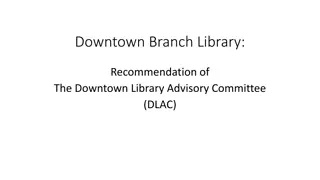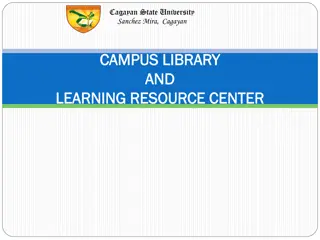Healthy Boundaries for Library Workers
Understanding the importance of boundaries for library workers, this presentation by Dawn Behrend explores the definitions of boundaries, common violations, reasons for patrons' boundary pushing, and why librarians need boundaries. It covers key learning objectives such as conceptualizing boundaries, recognizing violations, discussing personal and library-wide boundaries, enforcing boundaries, and developing self-care strategies.
Download Presentation

Please find below an Image/Link to download the presentation.
The content on the website is provided AS IS for your information and personal use only. It may not be sold, licensed, or shared on other websites without obtaining consent from the author.If you encounter any issues during the download, it is possible that the publisher has removed the file from their server.
You are allowed to download the files provided on this website for personal or commercial use, subject to the condition that they are used lawfully. All files are the property of their respective owners.
The content on the website is provided AS IS for your information and personal use only. It may not be sold, licensed, or shared on other websites without obtaining consent from the author.
E N D
Presentation Transcript
Healthy Boundaries for Library Workers Dawn Behrend, MA, MBA, MLS
Presenter Dawn Behrend, Lenoir-Rhyne University; Crossroads Counseling Center Instruction and Outreach Librarian at Lenoir-Rhyne University Licensed Psychological Associate at Crossroads Counseling Center Contact: dvbehrend@gmail.com
Learning Objectives Conceptualize boundaries and why we need them Recognize common boundary violations Discuss personal and library-wide boundaries Develop strategies for enforcing boundaries Begin to form effective self-care strategies
What is a Boundary? Guidelines or limits that a person has in place to identify what are permissible ways for others to behave around them and how they will respond if those limits are not kept. OR A psychological demarcation that protects the integrity of an individual or group or that helps the person or group set realistic limits on participation in a relationship or activity. APA Dictionary of Psychology
Why Do Librarians Need Boundaries? To protect their own physical and emotional well-being To create an equitable and inclusive space with consistent and reasonable expectations for all library users To create a safe space for patrons, particularly those with a trauma history To maintain a professional relationship with patrons
Common Boundary Violations in the Library Attempts to move into a friendship role Efforts to monopolize a librarian s time Failure to follow library use policies Use of intimidation or manipulation to obtain something Sexual harassment Physical aggression or verbal threats
Reasons for Patrons Boundary Pushing Loneliness, lack of social connections Mental Illness or developmental disorders Societal problems (homelessness, substance use disorders, domestic violence) Trauma history Intermittent reinforcement
Reasons for Librarians Not Enforcing Boundaries Not wanting to be mean Fear of a patron complaint Fear of an angry confrontation/safety concerns Personal trauma history Need to please or save others Professional burnout Negative reinforcement
Trauma-Informed Services An approach to service that assumes the individual (patrons and staff) may have a trauma history by: Realizing how widespread trauma is Recognizing the signs and symptoms of trauma Responding by integrating knowledge into practice Resisting doing further harm
Trauma-Informed Services-Resources Recommended readings: A Trauma-Informed Approach to Library Services by Rebecca Tolley The Weight We Carry: Creating a Trauma-Informed Library Workforce. (American Libraries Magazine) Toward a Trauma-Informed Model (American Libraries Magazine) Additional Resources: Trauma-Informed Libraries Facebook group Trauma-Informed Libraries LibGuide from Capital District Library Council. Trauma Informed Services in the Library: Webinar
Personal Boundaries Personal physical or mental health concerns Sexual orientation Information about one s family Preferred activities outside of work Spirituality Political views Inappropriate comments or language Physical touch or invasion of personal space
Sexual Harassment Uninvited and unwanted verbal or physical behavior of a sexual nature Requires a firm and immediate limit Call in a third party or leave if there is concern for safety Administrators should ensure library workers know their safety is vital and supported Libraries should have a process to document and report incidents ALA Harassment Resources
Library Boundaries-Library Use Policies Regularly review and update policies Provide ongoing staff training opportunities Clearly communicate policies in all commonly used languages Clearly describe the prohibited behavior and the consequences of engaging in the behavior Offer a tiered process that allows for warnings and the opportunity for the patron to comply Describe enforcement procedures including due process and fair warning
Library Policy Resources ALA s Guidelines for the Development of Policies and Procedures Regarding User Behavior and Library Usage ALA Code of Ethics Library Bill of Rights ADA: ALA s guide to ADA compliance, Library Services for People with Disabilities Policy
Enforcing Boundaries: Identifying and Redirecting the Behavior Be clear and direct in addressing the behavior Address the behavior, not the person or social condition Redirect to focus on the library
Enforcing Boundaries: Managing Challenging Responses Offer an appropriate behavioral alternative with a clear consequence if the behavior continues Be sure to enforce a consequence once it is given Consistency in enforcement It s okay for patrons to be upset
Preparing for Front Line Duties Familiarize yourself with library use policies and the enforcement guidelines Engage in some deep breathing exercises Manage any negative self-talk Be aware of your own triggers and how you will manage them Have a plan to step away if you become dysregulated
When to Get Help The patron is a threat to themselves or others: - Physical aggression - Verbal threats - Self-harming gestures You have become so dysregulated that you cannot manage the patron s needs or behaviors Do not allow a patron to come between you and an exit If you feel threatened, leave the situation and seek help from a co-worker, supervisor, or security
Next Steps Incident reports: Public Library Director s Toolkit Incident Report Appeals process for patrons Administrators should try to support staff who enforce limits whenever possible Take time to process the incident
But I Want to Help Empathy: Understanding and sharing the feelings of others vs. Sympathy: Feeling pity or sadness for someone
What Librarians Can Do for Patrons Practice good customer service & model healthy boundaries Provide information about community resources on mental health services, shelters for homelessness/domestic violence, social services, etc. Partner with community resources to provide presentations or information fairs on topics relevant to patron needs
Importance of Self-Care Prevent burnout Better manage any concerns with anxiety, depression, etc. Make time to reflect on your relationships (personal and professional) and what boundaries you may need to address more intentionally Avoid viewing self-care as an indulgence or just for when I have time
Self-Care First Step: Know Thyself Recognize how you experience stress Identify the sources of stress and problem solve Recognize how you deal with stress. Unhealthy vs. healthy coping mechanisms Self-Care Assessment:University of Buffalo School of Social Work
Self-Care Strategies for Your Personal Life Exercise Healthy, balanced diet Support of family and friends Sleep Stay hydrated Work in some pampering Find a hobby Spirituality Mindfulness
Self-Care Strategies for the Workplace Respect your time-arrive and leave on time each day Use your email auto respond to specify times of availability Maintain clear boundaries with patrons and co-workers Designate or renegotiate responsibilities Work in daily breaks Use your PTO Just say no
Tips for Lasting Change Focus on changing one behavior at a time. Start small and shape the behavior over time. Continue the behavior until it becomes a habit. Reward yourself for healthy choices.
Self-Care: Make a Plan My Maintenance Self-Care Plan Worksheet University of Buffalo School of Social Work
Additional Readings & Resources Stressors of Librarianship Smallwood, C., & Wade, L. B. (2013). Job stress and the librarian: Coping strategies from the professionals Jefferson, North Carolina: McFarland & Company. Burnout Bartlett, J.A. (2018). You too can prevent librarian burnout. Library Leadership & Management, 32(2)m 1-4. https://pdfs.semanticscholar.org/6668/c85064e058b9950cb3f6069972dcc8d42e97.pdf Bosque, D. D., & Skarl, S. (2016). Keeping workplace burnout at bay. College & Research Libraries News, 77(7), 349-355. https://crln.acrl.org/index.php/crlnews/article/view/9525/10838 Ford, Anne. (2019). Other duties as assigned: Front-line librarians on the constant pressure to do more. American Libraries. https://americanlibrariesmagazine.org/2019/01/02/mission-creep-other-duties-as-assigned/
Additional Readings & Resources- Continued Mindfulness Stressors and librarians: How mindfulness can help by Richard Moniz et. al. is available from College & Research Libraries News. Mindful Librarianship: Awareness of each moment helps librarians stay serene under stress by Ellyn Ruhlmann is available from americanlibrariesmagazine.org. Insights and Practical Tips on Practicing Mindful Librarianship to Manage Stress by Kristen Mastel and Genevieve Innes is available from the open access journal Libres. Moniz, R., et al. (2015). The Mindful Librarian: Connecting the Practice of Mindfulness to Librarianship. Chandos Publishing. Kabat-Zinn, J. (2012). Mindfulness for beginners : Reclaiming the present moment--and your life. Boulder, Colorado: Sounds True. Charney, M. Colvin, J. and Moniz, R. (2019), Recipes for mindfulness in your library: Supporting Resilience and Community Engagement. Chicago: IL: ALA Editions.
Suggested Webinar Recordings But I Work in a Library! How Trauma Affects Us and What We Can Do About It from Massachusetts Library System (https://vimeo.com/220517757) Self-Care: Protecting Yourself (and Others) from Burnoutfrom Florida Library Webinars (https://floridalibrarywebinars.org/self-care-protecting-yourself-and-others-from-burnout/) Understanding Compassion Fatigue in Your Library: View Webinar Recording (You will be prompted to log in to the free Course Catalog.) From WedJunction (https://learn.webjunction.org/course/search.php?q=Understanding+Compassion+Fatigue+in+Your+Library) Yoga as an Act of Self-care for Librarians from Texas Tech University Library (https://www.youtube.com/watch?v=IUndgFKglGA&feature=youtu.be) Mindfulness for Librarians: webinar hosted by South Central Regional Library Counsel (https://youtu.be/eblrItay3s0)
